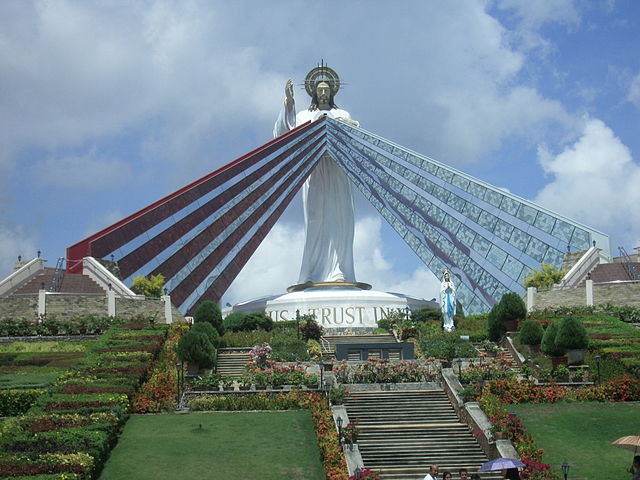
From the 2011 International Religious Freedom Report of the United States Department of State
Section I. Religious Demography
According to a November 2011 survey by the Institute of Public Opinion of the University of Central America, 46 percent of the population identifies itself as Roman Catholic; 33 percent as evangelical; 2 percent as Jehovah’s Witnesses; 1 percent as traditional Protestant; and 1 percent as “other.” Among the evangelicals, 59 percent identified themselves as Pentecostals, 22 percent as Baptists, and 19 percent as “other.” The survey reported 17 percent as having “no religion.” There are small communities of The Church of Jesus Christ of Latter-day Saints (Mormons), Jehovah’s Witnesses, Hare Krishnas, Muslims, Jews, and Buddhists. A small segment of the population observes indigenous religious practices.
Section II. Status of Government Respect for Religious Freedom
Legal/Policy Framework
The constitution and other laws and policies protect religious freedom. The constitution states that all persons are equal before the law and prohibits discrimination based on nationality, race, gender, or religion.
The penal code imposes criminal sentences of six months to two years on those who publicly offend or insult the religious beliefs of others, or damage or destroy religious objects. If such acts are carried out with and for the purpose of publicity, sentences increase to one to three years in prison. Repeat offenders face prison sentences of three to eight years. There have been no prosecutions under the law to date.
The constitution requires the president, cabinet ministers, vice ministers, Supreme Court justices, judges, governors, the attorney general, the public defender, and other senior government officials to be laypersons. In addition, the electoral code requires judges of the Supreme Electoral Tribunal and members of municipal councils to be laypersons.
The constitution grants official recognition to the Catholic Church and states that other religious groups may also apply for official recognition. The law grants tax-exempt status to all officially recognized religious groups. Regulations also make donations to officially recognized religious groups tax-deductible.
The civil code grants equal status to churches and nonprofit foundations. For religious groups, registration with the government confers legal recognition as a religious organization. Although religious groups may carry out religious activities without registering with the government, registration makes it easier to carry out activities that require official permits, such as building churches. To obtain official recognition, an organization or religious group must apply through the Office of the Director General for Nonprofit Associations and Foundations (DGFASFL) within the Ministry of Governance. The group must present its constitution and bylaws that describe the type of organization, location of its offices, its goals and principles, requirements for membership, type, and function of its ruling bodies, and assessments or dues. Before the DGFASFL grants registration, it must determine that the group’s constitution and bylaws do not violate the law. Once a group is registered as a nonprofit religious organization, notice of DGFASFL approval and the group’s constitution and bylaws must be published in the official gazette. The DGFASFL does not maintain records on religious organizations once their status has been approved.
The law for nonprofit organizations and foundations charges the Ministry of Governance with registering, regulating, and overseeing the finances of nongovernmental organizations (NGOs), non-Catholic churches, and other religious groups. The law specifically exempts the Catholic Church from the registration requirement. In 2011 there were 208 new requests for registration of religious groups, of which 120 were approved, 80 were pending, five withdrew voluntarily, and three were deferred for lack of response from the applicants. None were denied.
Noncitizens present in the country primarily to proselytize must obtain a special residence visa for religious activities and are not allowed to proselytize while on a visitor or tourist visa.
Public education is secular. Private religious schools operate freely. All private schools, whether religious or secular, must meet the same standards to obtain approval from the Ministry of Education.
A 1940 law established Holy Week holidays for public employees, and each year the Legislative Assembly issues a decree establishing Maundy Thursday, Good Friday, and Holy Saturday as official holidays for the private sector.
Government Practices
There were no reports of abuses of religious freedom.
Section III. Status of Societal Respect for Religious Freedom
There were no reports of societal abuses or discrimination based on religious affiliation, belief, or practice. Leaders of the Catholic, Lutheran, Anglican, Baptist, evangelical, Islamic, Jewish, and Buddhist religious groups participate in the Council of Religions for Peace. During 2011, the Council organized events to commemorate the 1980 assassination of Archbishop Oscar Arnulfo Romero during the civil war, discuss environmental issues, and address violence, crime, prison conditions, and law enforcement from a human rights perspective. It also conducted an awareness campaign against violence.
Section IV. U.S. Government Policy
Embassy officials regularly met with principal religious leaders, church-sponsored universities, and religiously-affiliated NGOs. Meetings with religious leaders included individuals representing indigenous religions.